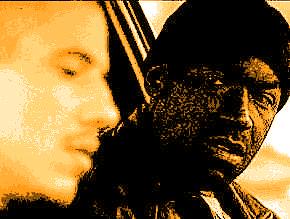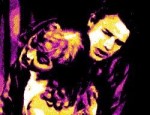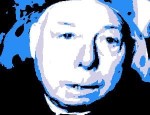Film Review
13m2 is the latest in a
seemingly endless series of films over the past decade or so to
thrust into our faces stark visions of the ugly urban underbelly of French
society, reminding us that, despite numerous political initiatives,
things are not getting better for those at the bottom of the
heap. It has been well over a decade since Mathieu Kassovitz woke
us all up to the escalating problems of social exclusion and racial
tensions in inner cities with his startling film
La Haine
(1995), but these problems haven't gone away and seem only to have
worsened - or so the latest generation of hot-headed young filmmakers
will have us believe.
The hot-headed youngster behind this latest grim portrait of social
deprivation and urban crime is Barthélémy Grossmann, who not only directs
the film but also plays the leading role. In what is his debut
film, Grossmann shows immense promise both as a director and an actor,
and succeeds admirably in getting across to his audience the bleakness of the lives of those
unfortunates who have become, through no fault of their own, vermin
that live off the putrid dregs of a soulless capitalist system. For some of
these unfortunates, crime isn't a choice, it is necessary for survival.
The film has one or two inspired touches (such as the idea of
letting us hear but not see the brutal robbery) but equally there are
some careless artistic over-indulgences that cause you to grind your
teeth in frustration (the over-use of fancy camera effects such as the
fast zoom being a case in point).
13m2 is by no means perfect but
it does provide a sobering reflection on the corrupting
influence of money, as well as a reminder of the deeply
fractured society that raw capitalism and countless failed government
policies have brought into being.
© James Travers 2009
The above content is owned by frenchfilms.org and must not be copied.
Film Synopsis
Living in the rough suburbs of present-day Paris,
José, Farouk and Réza are three wild young men
who find life hard and increasingly precarious. To survive, they
allow themselves to be drawn deeper and deeper into crime.
Their most desperate act so far is to attack an armoured van and
steal the cash it contains. Unfortunately, the robbery
does no go quite as planned and the three friends are soon
holed up in their tiny hide-out. There plan is to remain
here until things have cooled down a bit. It isn't long
before their self-inflicted imprisonment begins to have an effect
on them. Their real enemy is not the police. It is themselves...
© James Travers
The above content is owned by frenchfilms.org and must not be copied.



